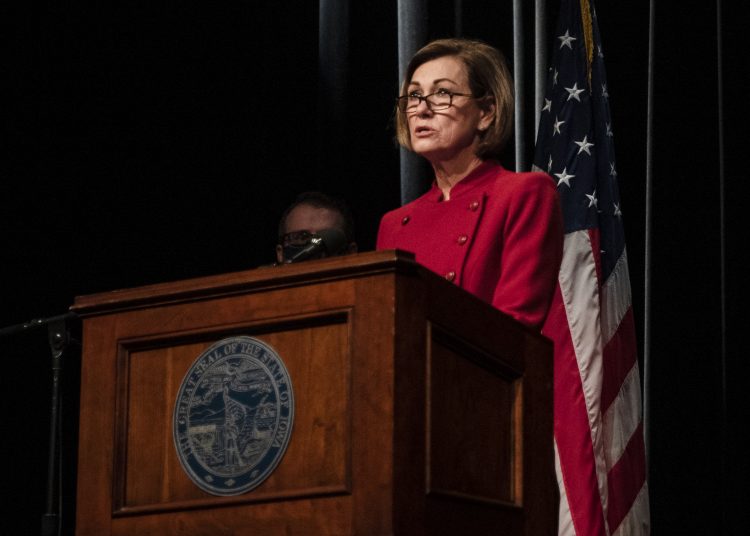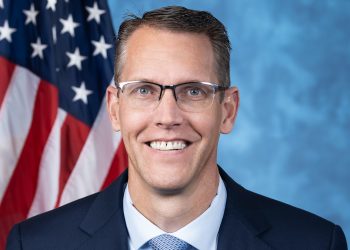DES MOINES, Iowa – Gov. Kim Reynolds joined 21 governors in releasing a joint statement opposing the new standard in President Joe Biden’s stimulus bill for how federal funds would be allocated to states:
“Unlike all previous federal funding packages, the new stimulus proposal allocates aid based on a state’s unemployed population rather than its actual population, which punishes states that took a measured approach to the pandemic and entered the crisis with healthy state budgets and strong economies.
“A state’s ability to keep businesses open and people employed should not be a penalizing factor when distributing funds. If Congress is going to provide aid to states, it should be on an equitable population basis.”
In addition to Reynolds, governors who joined the statement include Kay Ivey of Alabama, Mike Dunleavy of Arkansas, Doug Ducey of Arizona, Ron DeSantis of Florida, Brian Kemp of Georgia, Brad Little of Idaho, Eric Holcomb of Indiana, Laura Kelly of Kansas, Tate Reeves of Mississippi, Mike Parson of Missouri, Greg Gianforte of Montana, Pete Ricketts of Nebraska, Chris Sununu of New Hampshire, Doug Burgum of North Dakota, Mike DeWine of Ohio, Kevin Stitt of Oklahoma, Henry McMaster of South Carolina, Kristi Noem of South Dakota, Bill Lee of Tennessee, Spencer Cox of Utah and Mark Gordon of Wyoming. Kelly was the only Democratic governor to sign the statement.
The 33 states expected to lose funding under this proposal, which was adopted by the U.S. House of Representatives on Saturday morning by a 219 to 210 vote, include the following:
* Alabama
* Alaska
* Arkansas
* Delaware
* Florida
* Georgia
* Idaho
* Indiana
* Iowa
* Kansas
* Kentucky
* Maine
* Minnesota
* Mississippi
* Missouri
* Montana
* Nebraska
* New Hampshire
* North Carolina
* North Dakota
* Ohio
* Oklahoma
* Oregon
* South Carolina
* South Dakota
* Tennessee
* Utah
* Vermont
* Virginia
* Washington
* West Virginia
* Wisconsin
* Wyoming
According to a report by House Budget Republicans, Iowa will lose $734 million under the new funding formula in the “American Rescue Plan Act.”
U.S. Rep. Cindy Axne, D-Iowa, was the only member of Iowa’s U.S. House delegation to vote in favor of the bill, U.S. Reps. Randy Feenstra, R-Iowa, Ashley Hinson, R-Iowa, and Mariannette Miller-Meeks, R-Iowa, voted against the bill.
“Nearly one year since our first COVID-19 cases came to Iowa, this virus is still hanging over our communities and families. Tens of thousands of Iowans are out of work, and many more are fighting to make ends meet, protect their parents and children, and keep a roof over their heads and food on their tables,” Axne said in a released statement before the vote. “The American Rescue Plan prevents current protections from lapsing, puts money in the pockets of those who are struggling, and enables our health care professionals to quickly and efficiently ramp up our vaccination efforts so that we can finally put this pandemic behind us. I’m proud to vote for this comprehensive legislation, and urge my Senate colleagues to approve it quickly to ensure benefits are distributed without delay.”
House Democrats also voted to strike an amendment sponsored by Feenstra that would aid Iowa farmers hurt by the August 10 Derecho that blew through Iowa, as well as, the pandemic.
“I’m extremely disappointed that Democrats in the House have voted to turn their backs on Iowa farmers by voting to ax derecho disaster relief. We’re about to enter planting season, and many farmers are still recovering from losses due to the pandemic and last year’s devastating derecho. Farmers across the country who suffered from natural disasters in 2020, in the middle of this pandemic, need relief now,” he said in a released statement.
“Despite Democrats’ ridiculous excuses for cutting this disaster assistance, my amendment was stripped for one simple, obvious reason: It was led by a Republican. Democrats chose to put politics over people, leaving struggling Iowa farmers in the dust. Iowans deserve better from Democrats. All of rural America deserves better from Democrats,” Feenstra added. “As the only bipartisan amendment to pass out of any committee, it was the last hope for bipartisanship in the entire reconciliation process. But it’s clear Democrats have never been interested in ‘unity.’ They’re only interested in advancing their agenda — an agenda that benefits coastal states and leaves Iowans behind.”
He provided testimony before the House Rules Committee.
Hinson spoke out again the bill during a floor speech.
“(T)his behemoth of a bill fails to provide the targeted relief my constituents asked for. It forces taxpayers to bail out states that have chronically mismanaged their budgets. It includes a $15-dollar federal minimum wage hike, which would decimate the rural economy in Iowa and destroy the very livelihoods this bill claims to be saving,” she said.
“It opens the door for taxpayer dollars to fund abortions. And with $1 trillion dollars from previous relief packages still unspent, this legislation still contains no guardrails to ensure new money is used on pandemic relief this year. This legislation abdicates our responsibility to those who need our support and to taxpayers,” she added.
Miller-Meeks spoke out against the bill.
“I am disappointed that all Republican amendments, including Rep. Feenstra’s bipartisan derecho disaster relief amendment, were blocked from this $1.9 trillion bill. With almost $1 trillion of previous bipartisan funding packages remaining unspent and now over a trillion in new funds only tangentially related to the COVID pandemic; it is unacceptable that less than 1/2 of 1% of the total funds in this bill will go to fund local and state public health workers. Additionally, roughly 9 percent of the funds are going to vaccines, testing, and contact tracing, which is simply not enough,” she said in a released statement.
“Across Iowa’s 99 counties, local public health officials are intelligent, experienced, and capable to dispense vaccines in a rapid and efficient process. Acknowledging the tremendous work that our state and local public health workforce does on a daily basis and FUNDING their efforts directly down to the community level with non-competitive local public health grants will go a long way towards defeating this virus and get America back on its feet,” Miller-Meeks added.
















